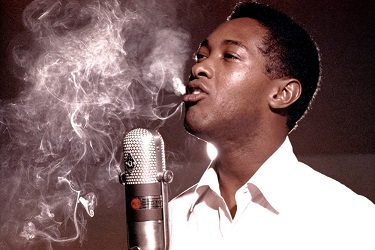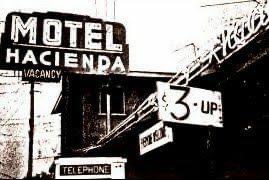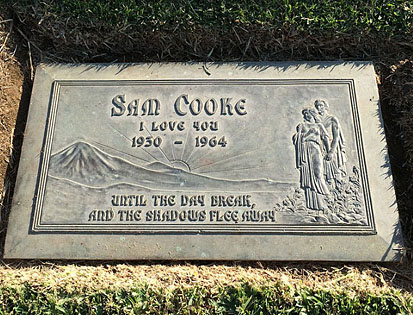Tribute: Sam Cooke

Most people remember Sam Cooke as a smooth crooner, a singer on par with Bobby Darin and Frank Sinatra. Cooke's songs were polished and smooth as he sang about love, longing and dancing. But Sam Cooke has left a far deeper legacy. He was a pioneer in the Civil Rights movement and one of the first black entrepreneurs in the music industry. He fought segregation and strived to create a fair and profitable niche for black musicians. Perhaps these activities, occuring during the pervasive racial unrest of the 1960s, contributed to his mysterious and violent death.
Samuel Cook (the "e" was a later addition) was born on 22 January 1931 in Mississippi. His family moved to Chicago when Sam was quite young. His father was a pastor and Sam grew up in the church, singing Gospel. As a young man, he joined a popular gospel group, The Soul Stirrers. (The Soul Stirrers, including Cooke, were inducted into the Rock & Roll Hall of Fame in 1989 and the Vocal Group Hall of Fame in 2000.) With the Soul Stirrers, Cooke was able to travel the country and was exposed, first-hand, to the rampant and brutal Jim Crow policies of the American South. The singing group had to patronize inferior "blacks only" accomodations and eating establishments. Concerts were segregated and the news was never short on reports about the abuses whites were raining down upon the black population.
After several years with the Soul Stirrers, Cooke decided to break out on his own and pursue more mainstream music. His first success was with the wildly popular "You Send Me". He would eventually score 30 Top 40 hits between 1957 and 1964. Cooke was already disgusted by the conditions of the Jim Crow South, including the murder of Emmett Till (which occurred in 1955). He was further enraged by the probable murder of fellow singer, Jesse Belvin, in 1960. (You can learn Belvin's story on his Tribute page.) Cooke famously refused to play concerts that demanded a segregated audience. He also formed friendships with celebrated boxer, Cassius Clay (later known as Muhammad Ali) and political activist, Malcolm X. Cooke's activities opposing the status quo, and his association with two prominent Black Rights leaders, made him a person of interest to the FBI and others who resisted integration and equality.
In addition to working for Civil Rights, Cooke started a record company to promote black artists and ensure their fair payment. (During the early days of the music industry, many artists - especially black artists - were denied full royaly payments and were tricked into contracts that heavily favored the record companies, allowing for a small, one-time fee for the artists.) Cooke was threatening the music establishment by asserting the rights of the artists, thus shrinking the profits of the big record companies. Many record companies are thought to also have had ties to the mob.

Sam Cooke's popularity, power and influence were growing. His disregard for corporate white America was agitating more than a few whites with racial superiority complexes. So was Sam Cooke's death an accident? Or a conspiracy to commit murder accompanied by a cover-up? All we know for sure is that Sam Cooke shared drinks with a woman, accompanied her to a seedy motel, and was shot and killed while dressed only in a sport coat and one shoe.
On the night of 10 December 1964, Cooke was having dinner with friends at Martoni's, an Italian restaurant, and was apparently flashing a lot of cash. His friends departed, leaving Cooke drinking at a bar with Elisa Boyer. Cooke and Boyer proceeded to the Hacienda Motel ($3 a night) in El Segundo, outside of Los Angeles, around 2 AM. Boyer would claim Cooke kidnapped her. Cooke registered for the room under his own name. Seeing that Boyer was accompanying him, the manager, Bertha Franklin, insisted they register as "Mr. & Mrs. Cooke". By Boyer's account, Cooke brought her to a motel room, had her strip to her undergarments and pushed her on to the bed. Apparently he also disrobed. Boyer allegedly tried to exit through the bathroom window, but it was painted shut. Later, when Cooke went to the bathroom, she saw another chance for an escape. Supposedly fearing that Cooke was intending to rape her, Boyer grabbed her pile of clothes (and Cooke's in the process) and fled. Furious, Cooke, wearing just his sport coat and one shoe, went to the manager's office, demanding to know where Boyer went. A block away, Boyer was dressing and calling the police from a phone booth. The manager (Bertha Franklin) claimed Cooke rammed down her door and accosted her, grabbing her wrist and insisting she tell him where Boyer had gone. Franklin grabbed a gun and shot at Cooke three times, hitting him once in the chest. "Lady, you shot me," were Cooke's final words.
For (graphic) photos of the crime scene and a picture of Cooke at his funeral, follow this link.

Sam Cooke's death on 11 December 1964 was barely investigated and ruled a "justifiable homicide." Cooke was 33 years old.
Within a week of Cooke's death, it was decided that it was a "justifiable homicide". Boyer and Franklin gave testimony at the inquest; Sam Cooke's lawyer ws allowed to ask only one question. The singer had over $100 in his sport coat, so the police did not consider the incident an attempt at robbery. Yet friends recalled seeing Cooke flashing thousands of dollars at the restaurant. At his funeral, singer Etta James and Muhammad Ali were shocked to see how badly Cooke had been beaten. It seemed far too severe for Bertha Franklin, alone, to have inflicted such injuries. James said, "His head was nearly separated from his shoulders. His hands were broken and crushed, and his nose mangled."
A month later, Boyer was arrested for prostitution. In 1979, she was convicted for the murder of her boyfriend.
Sam Cooke's death was illogical and ignored by law enforcement. Many questions remain unanswered. For example, how can Boyer claim kidnapping, when she seemed to willingly accompany Cooke to the motel room? If she felt so threatened, why didn't she lock herself in the bathroom while she was in there? Because of the lack of attention given to the case, we'll never know if the bathroom even had a lock. Bertha Franklin grabbed a gun when Cooke had supposedly grabbed ahold of her wrist. Did she struggle and get away, or is the entire story pure fiction? She admitted to shooting at Cooke - three times - because he was angry and grabbed her wrist - is that enough to justify killing a man? If Cooke was irate and violent as both women claim, was there evidence of any injuries or defensive wounds to either woman? What happened to the wad of cash Cooke had in his possession earlier in the evening? Why was Cooke's lawyer only allowed one question at the inquiry into his death? How do you account for Cooke's severe injuries witnessed by those at his funeral?
Some people theorize that Sam Cooke's death was an attempt by Boyer to rob the singer (possibly with Franklin as an accomplice) that had gone horribly wrong. Others believe Cooke was set up becasue he was a black man who was wielding some serious popularity, influence and power, among both blacks and whites. That might explain law enforcement's dismissal of the entire event - a cover-up. Or perhaps, as others perceive it, Cooke's death was brushed under the rug simply because the police considered him just another black man who was the victim of black-on-black violence, not worth their investigatory efforts.
Sam Cooke's funeral was attended by 200,000 mourners. His song, "A Change is Gonna Come", was released posthumously and became a Civil Rights anthem. Sam Cooke was inducted as a solo artist into the Rock & Roll Hall of Fame in 1986. He was inducted into the Songwriters Hall of Fame in 1987. In 1994, he received a star on the Hollywood Walk of Fame. He was given a Grammy Lifetime Achievement Award in 1999. In 2011, Chicago renamed a portion of East 36th Street as "Sam Cooke Way". Cooke was inducted into the National Rhythm and Blues Music Hall of Fame in 2013. He has also been inducted into the Mississippi Musicians Hall of Fame.
Interesting aside (possible conspiracy theory?): Just 77 days after Cooke's murder, his widow, Barbara, tried to marry his backing guitarist, Bobby Womack. She was ten years his senior, and he wore one of Cooke's suits to the courthouse. They were barred from being married because Womack was under 21 (he was 20 years old) and did not have parental consent. The couple ended up marrying about a week later - the day after Womack's 21st birthday. Friends, family, and the musical community were enraged and ostracized the couple. Sam Cooke's brothers went so far as to attack Womack, breaking his jaw.
The marriage did not last. Five years later, Barbara and Bobby separated when she discovered that he was having an affair with her 17-year-old daughter, Linda Cooke. Barbara fired a gun at Womack, the bullet grazing his head. Linda never spoke to her mother again, and ended up marrying Bobby's brother, Cecil Womack. They formed the R&B duo, Womack & Womack ("Baby I'm Scared of You").

